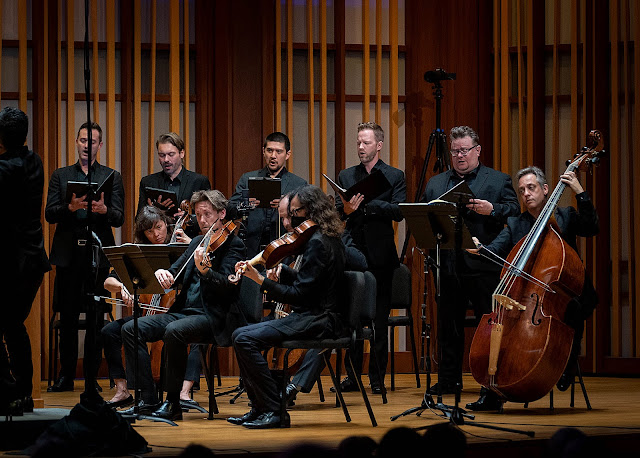The Binational, Cross-Border, Bilingual Project Featured Spanish-Speaking Soloists and a Performance in Tijuana at the Tijuana Cultural Center
by Alejandra Enciso-Dardashti
 |
| Bach Collegium San Diego. Photo: Facebook |
Bach Collegium San Diego, one of the country’s leading ensembles performing historically informed performances repertoire from the Renaissance, Baroque, and early classical eras, presented the entire Handel’s Messiah, in Spanish, performed on historically accurate instruments with two performances in San Diego and one in Tijuana.
The company commissioned a Spanish libretto of Handel’s Messiah with the purpose of performing it in one of the vernacular languages of our immediate community, both in the United States and Mexico.
Messiah has been a mainstay of the Bach Collegium San Diego season throughout the company’s history, but Artistic Director Ruben Valenzuela has always sought to present different versions in order to showcase Messiah's versatility and eternal appeal. Valenzuela developed his own love of music through experiencing Messiah excerpts in Spanish during his childhood and musically formative years. The complete performance in Spanish brought together Valenzuela's longtime goal of a dynamic, historically informed performance in keeping with Messiah's ongoing history of a work that adapts, is malleable and responds to the world around it.
In addition to founding and leading Bach Collegium San Diego, Ruben Valenzuela is Director of the Music and Organist of All Souls’ Episcopal Church, San Diego, and the Choral Director of the La Jolla Symphony and Chorus. As a musicologist, he has undertaken research at the Centro Nacional de Investigación, Documentación e Información Musical, Carlos Chavez (CENEDIM, Mexico City), and engaged in research at the Archivo del Cabildo of Mexico City Cathedral. He holds a Ph.D. in Musicology from Claremont Graduate University.
The Many Messiahs
Since the oratorio's premiere in Dublin, Ireland, in 1741, Handel's Messiah has permeated the fabric of Western culture. Handel performed the work continuously, most notably in charitable performances connected to London’s Foundling Hospital. Handel continuously adapted and rearranged the work to suit the strengths of his singers, his evolving orchestral resources, and overall intentions. By the time of Handel's death in 1759, one could legitimately consider 10 distinct versions of the work, with no less than 43 versions of the 15 arias.
Messiah has an unbroken performance history, continuously evolving through time according to the needs of a particular age. In the late 18th century Mozart took his own hand to Messiah (Der Messias) by adapting a version suitable for Viennese audiences in the German language and with expanded orchestral forces. As the work grew in popularity into the 19th and 20th centuries, so the ongoing adaptations and reimagining as related to performance practice. In our own time, the influence of the historically informed performance movement has brought the work full circle, seeking to return to Handel's own performance tradition.
 |
| Ruben Valenzuela. Bach Collegium San Diego. Photo: Facebook |


No comments:
Post a Comment